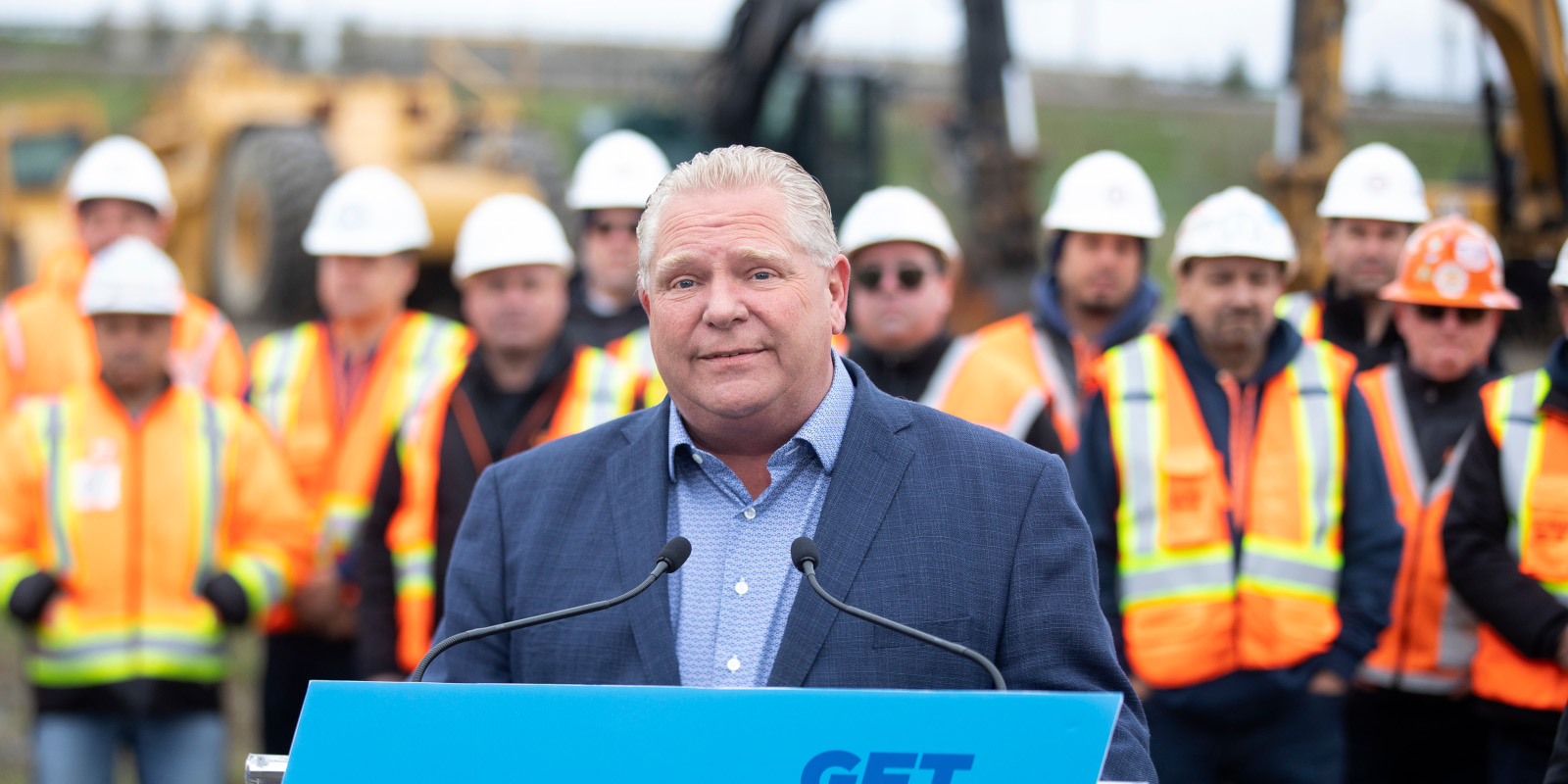At A Glance
- “We’re new to talking their language,” says Mitch Heimpel, who held senior roles in Ford’s government, on the relationship with labour unions.
- The PC government’s outreach to labour unions was one of the most talked-about stories of the June election when the PCs won a sweeping majority.
- Although Bill 28 was unpopular among Ontarians, Heimpel says polling data suggests Ford’s government has not been hurt much by the strike action.
Has the ongoing controversy over the Canadian Union of Public Employees strike action and Queen’s Park’s harsh response permanently soured the apparent budding romance between Ontario’s organized labour and the Progressive Conservative government?
In the face of CUPE’s notice to strike earlier this month, the Ford government enacted Bill 28, which not only made the strike illegal but also imposed a unilateral wage settlement on the union’s 55,000 employees. The law provoked outrage among Ontario’s public and private sector unions, including some who had endorsed the Ontario Progressive Conservative Party in the recent provincial election.
The government subsequently repealed Bill 28 and both parties agreed to return to the negotiating table. However, on Wednesday, CUPE announced that the talks had failed to produce an agreement and it was once again filing notice of a potential province-wide strike that could begin next week.
Education Minister Stephen Lecce expressed disappointment about the union’s latest announcement and called on its leadership to return to negotiations. At the time of writing, it is unclear what the next steps in the labour dispute may be.
But this ongoing tension between the Ford government and provincial unions has led to bigger questions about the durability of efforts on the part of PC Party to strengthen its relationship with labour unions in particular and Ontario’s working class in general.
“[Union members] so value their right to negotiate a deal that imposing a deal on them and then removing the right to strike fundamentally spoke to core values union members hold,” says Mitch Heimpel, who held senior roles in Ford’s government during its first term. “Because we’re new to talking their language, I’m not sure we had an appropriate grasp on how core that was for some of them.”
The contrasting messages coming out of the government may also be an illustration of how challenges in different ministries can scramble the overarching strategy. The new relationship between labour organizations and the PC Party grew out of Labour Minister Monte McNaughton’s efforts at outreach during Ford’s first term, while the battle with education workers falls under the umbrella of the premier’s office and the education ministry, which have both drawn criticism for school closures and now see keeping kids in school as a high priority.
Prior to the thaw, the PC government even indicated it would use Section 33 of the Charter of Rights and Freedoms, better known as the Notwithstanding Clause, to override any constitutional challenges to Bill 28.
“I think you’re unlikely to see Ford proactively use the Notwithstanding Clause to interfere in the collective bargaining process in the future. It proved wildly unpopular—and not just among union members,” says Larry Savage, a professor of Labour Studies at Brock University.
Whether or not union members and the PCs feel jilted at the moment, all relationships have rough patches here and there, and this strike may be just one of them.
“Bill 28 has destroyed any goodwill between Ford’s government and most segments of the labour movement, but he has not irreparably harmed his relationship with the unions that endorsed him in the provincial election,” says Savage.
The PC government’s outreach to labour unions was one of the most talked-about stories of the June election when the PCs won a sweeping majority, flipping ridings in cities like Hamilton and Brampton with large blue-collar constituencies. It was heralded by some observers as part of the broader Anglo-American trend of a so-called “political realignment” in which traditional working-class voters are shifting to the political Right.
Several unions, representing mostly workers in the private sector and especially the construction industry, had endorsed the PC government’s re-election.
Many unions that endorsed Ford released statements of concern surrounding Bill 28 but generally avoided echoing the more hardline rhetoric of CUPE.
Savage says as long as the PC government won’t threaten their capacity to exist or exercise core functions like striking, construction workers will not be hostile.
“Frankly, construction unions would work with any party or government, provided they were getting something out of it,” says Savage. “They worked closely with McGuinty’s (Ontario premier from 2003 to 2013) government over many years. They work closely with Trudeau, it’s not ideological, it’s all transactional.”
The Ford government has embarked on a slew of new, major construction projects in Ontario, such as the proposed Highway 413 in the Peel Region, a new GO train station in Hamilton, and streamlined housing developments.
Other actions by the PC government geared towards working interests include legislation that bans job-related communications outside of employee schedules and mandating washroom access for delivery drivers at their destinations.
Neither CUPE nor any of the unions that endorsed Ford’s government in June could be reached for comment before publication.
Mitch Heimpel says there are good reasons why unions are reluctant to talk about the strike.
“Right now, they all benefit from a show of force on labour solidarity,” says Heimpel. “There are internal disputes between unions and how the labour movement behaves that this incident has been able to paper over.”
Joseph Rose, Professor Emeritus at McMaster University’s DeGroote School of Business, says there are differences between public and private sector unions, especially in the construction industry, which benefits from infrastructure and commercial development.
“It’s the provincial government who funds the hospitals, the schools, et cetera, so they’re the paymaster,” says Joseph Rose. “That’s certainly one factor to take into account that is certainly distinguishable from the private sector.”
Heimpel says that market factors, or lack thereof, make it far more likely for public sector unions like CUPE to call a strike.
“In the private sector, most union members will tell you the right to strike is an absolute last option,” says Heimpel. “They understand that when a work stoppage occurs, that market competition starts to take over and work orders go out to competitors.”
Although Bill 28 was unpopular among Ontarians, Heimpel says polling data suggests Ford’s government has not been hurt much by the strike action, pointing out surveys displaying the Progressive Conservatives continue to enjoy similar leads that won them the provincial election in June.
The Ontario Liberal Party, currently the third-largest party in the legislature, has been critical of the PC government’s actions throughout the negotiations.
In 2012, Liberal Premier Dalton McGuinty recalled the legislature early in August, before the fall session, to preempt a strike by public school teachers and impose a two-year contract on them.
The McGuinty government’s actions were labelled “draconian” at the time.
“The (Ontario) Liberals really set this in motion in 2012 by legislating the end to strikes that hadn’t taken place yet,” says Heimpel. “It gets intensely hypocritical of the OLP, after going through that experience 10 years ago, to all of the sudden find religion now.”
While Heimpel admits he’s inclined to scold the Ontario Liberals, he points out premiers from every provincial party including Progressive Conservatives Doug Ford and Mike Harris, Liberals Kathleen Wynne and Dalton McGuinty, and even New Democrat Bob Rae have had disputes with public sector unions.
“I submit to you that if you’ve managed to run afoul of those five people, who have very little in common elsewise, they might not be the problem,” says Heimpel.
Although Ford’s government has taken a hit in popularity, Rose believes the CUPE strike action occurred too early in the Ford government’s second term to have any decisive effect in the next provincial election. Rose also says relations between Queen’s Park and organized labour tend to be tense regardless of the party in government.
“Whoever sat in Queen’s Park, either the Liberals or the Tories, the relationship can be described as pretty tense, with a tendency on the part of both the Liberals and the Conservatives to resort to legislation to try to get a bargaining outcome that suits their particular needs,” says Rose.
Barring an early election, Ontarians will have to wait almost four years to find out if the CUPE strike will have any effect on the PC government’s long-term prospects.
Recommended for You

‘Our role is to ask uncomfortable questions’: The Full Press on why transgender issues are the third rail of Canadian journalism

Need to Know: Mark Carney’s digital services tax disaster

Theo Argitis: Carney is dismantling Trudeau’s tax legacy. How will he pay for his plan?

‘They’re voting with their eyeballs’: Sean Speer on the revealed preferences of Canadian news consumers




